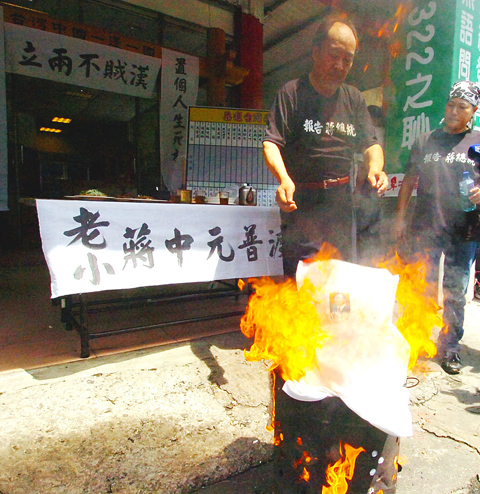Chinese Nationalist Party (KMT) Chairman Wu Poh-hsiung (吳伯雄) yesterday reiterated the party’s determination to fight corruption and urged party members not to gloat over the money-laundering allegations against former president Chen Shui-bian (陳水扁).
Speaking at a KMT Central Standing Committee meeting, Wu asked the central policy committee and party caucus to push for a law on unclear sources of property and seek an amendment to the Statute for the Punishment of Corruption (貪污治罪條例) in the next legislative session, which starts next month.
“We will not take pleasure in Chen Shui-bian’s case. Instead, we, and all politicians, should learn the lesson from the incident that no one can hide the truth forever,” Wu said yesterday at KMT headquarters.

PHOTO: HUANG CHI-YUAN, TAIPEI TIMES
Director of the KMT’s policy committee Lin Yi-shih (林益世) will communicate with the Ministry of Justice and the Judicial Yuan on establishing the regulations, the committee decided.
KMT caucus secretary-general Chang Sho-wen (張碩文) said yesterday that the caucus would propose the regulations in the legislature as soon as the new session begins.
KMT Legislator John Wu (吳志揚), the son of Wu Poh-hsiung, initiated a similar proposal last spring, suggesting that any official who failed to explain how he or she managed to accumulate large amounts of wealth should face up to three years in prison and a fine of up to NT$10 million (US$318,000).
The bill went to a preliminary review by the Judiciary and Organic Laws and Statutes Committee on May 29, but did not clear the legislative floor before the legislature went into recess last month.
The KMT chairman also rebutted allegations that some KMT members felt that President Ma Ying-jeou’s (馬英九) administration had handled the case involving Chen too slowly. The party will spare no effort in assisting the government with investigating Chen’s case, Wu Poh-hsiung said, and will work for clean government.
“No matter how embarrassing or despicable the truth is, we need to face it with courage ... People will no longer trust the government if we fail to investigate this case thoroughly, and it will shake the nation to its roots,” Wu Poh-hsiung said.
Meanwhile, in related news, the Central Election Commission (CEC) yesterday said it formed a task force to probe the allegations that Chen laundered campaign funds. The task force will look into whether Chen violated any laws by not declaring campaign funds in full and whether the CEC had any authority to impose sanctions on him.
“We will find out which laws or clauses originally listed under the CEC’s jurisdiction may apply to Chen’s case and whether we can intervene as an independent government institution,” CEC secretary-general Teng Tien-yu (鄧天祐) said after a two-hour task force meeting.
Regulations on declaring campaign funds were listed under the Election and Recall Law of Public Servants (公職人員選舉罷免法) and the President and Vice President Election and Recall Law (總統副總統選舉罷免法) until last year. After the clauses moved to other legislation, the CEC lost jurisdiction over violations of the rules.
However, as the case involves acts that occurred before last year, the CEC believes it may still have jurisdiction.
“If the CEC cannot handle the case, we will provide assistance to parties such as the court,” Teng said.
Under the original clauses, “Chen may be fined between NT$500,000 and NT$2.5 million,” he said.

A preclearance service to facilitate entry for people traveling to select airports in Japan would be available from Thursday next week to Feb. 25 at Taiwan Taoyuan International Airport, Taoyuan International Airport Corp (TIAC) said on Tuesday. The service was first made available to Taiwanese travelers throughout the winter vacation of 2024 and during the Lunar New Year holiday. In addition to flights to the Japanese cities of Hakodate, Asahikawa, Akita, Sendai, Niigata, Okayama, Takamatsu, Kumamoto and Kagoshima, the service would be available to travelers to Kobe and Oita. The service can be accessed by passengers of 15 flight routes operated by

Alain Robert, known as the "French Spider-Man," praised Alex Honnold as exceptionally well-prepared after the US climber completed a free solo ascent of Taipei 101 yesterday. Robert said Honnold's ascent of the 508m-tall skyscraper in just more than one-and-a-half hours without using safety ropes or equipment was a remarkable achievement. "This is my life," he said in an interview conducted in French, adding that he liked the feeling of being "on the edge of danger." The 63-year-old Frenchman climbed Taipei 101 using ropes in December 2004, taking about four hours to reach the top. On a one-to-10 scale of difficulty, Robert said Taipei 101

MORE FALL: An investigation into one of Xi’s key cronies, part of a broader ‘anti-corruption’ drive, indicates that he might have a deep distrust in the military, an expert said China’s latest military purge underscores systemic risks in its shift from collective leadership to sole rule under Chinese President Xi Jinping (習近平), and could disrupt its chain of command and military capabilities, a national security official said yesterday. If decisionmaking within the Chinese Communist Party has become “irrational” under one-man rule, the Taiwan Strait and the regional situation must be approached with extreme caution, given unforeseen risks, they added. The anonymous official made the remarks as China’s Central Military Commission Vice Chairman Zhang Youxia (張又俠) and Joint Staff Department Chief of Staff Liu Zhenli (劉振立) were reportedly being investigated for suspected “serious

Taiwanese and US defense groups are collaborating to introduce deployable, semi-autonomous manufacturing systems for drones and components in a boost to the nation’s supply chain resilience. Taiwan’s G-Tech Optroelectronics Corp subsidiary GTOC and the US’ Aerkomm Inc on Friday announced an agreement with fellow US-based Firestorm Lab to adopt the latter’s xCell, a technology featuring 3D printers fitted in 6.1m container units. The systems enable aerial platforms and parts to be produced in high volumes from dispersed nodes capable of rapid redeployment, to minimize the risk of enemy strikes and to meet field requirements, they said. Firestorm chief technology officer Ian Muceus said